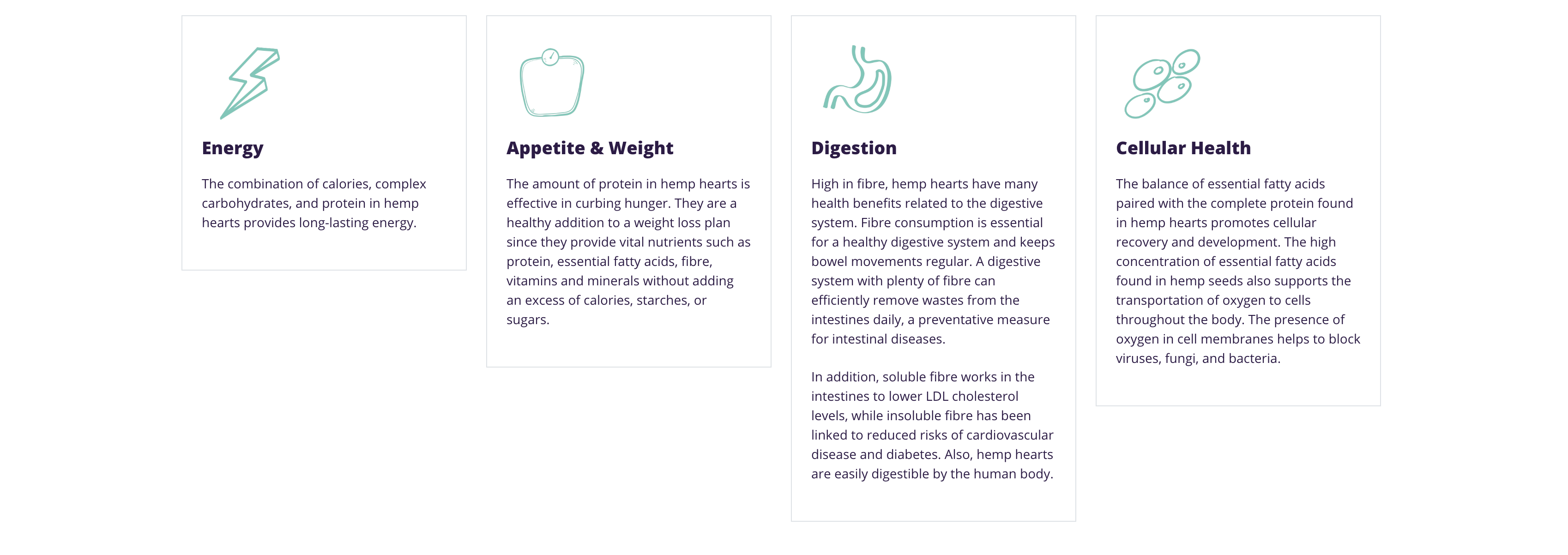Functional Benefits of Hemp

Protein
Protein is essential for the body and mind to maintain optimal health and wellbeing.
There are over 10,000 proteins required to keep us functioning at our best health as human beings. Protein is best known for building and maintaining healthy muscles, repairing damaged tissues, maintaining strong bones, vibrant skin and hair, and enabling many hormone/enzyme functions in the body.
Hemp is a complete plant protein containing 20 amino acids (including the nine essentials our body requires us to obtain from our food). This fact makes hemp seeds the ideal protein choice for vegans, vegetarians, and anyone looking to reduce the meat content of their diet. Two of the main proteins in hemp are Edestin and Albumin; they are readily digestible and boost the immune system.
With a complete collection of amino acids boasting the highest digestibility of any vegetable protein and the bonus of essential fatty acids, minus the enzyme inhibitors found in soy that cause gas - hemp is genuinely the perfect plant-based protein.
Hemp is a "gentle" protein source and is tolerated well by people with sensitive stomachs. However, some proteins can be challenging to digest due to the presence of oligosaccharides. Hemp is free of oligosaccharides and is easy to assimilate.
Healthy Fats
Unlike many other plant seeds, hemp contains nature’s perfect ratio (1:3) of omega-3 to omega-6 essential fatty acids required for optimal long-term health.
In today’s food supply, we see more people consume higher levels of omega-6, which disrupt the body’s fatty acid balance and increase inflammation and associated conditions.
Our bodies do not produce essential fatty acids and can only be obtained through the diet.
Hemp seed oil is an excellent plant-based omega-3 alternative to fish or fish oil for vegans, vegetarians, or those wanting to include more plant-based meals.
Ananda Food Hemp seed oil makes a great addition to smoothies, sauces, salad dressings, and those eating keto.
Fibre & Prebiotics
Most Australians do not eat enough fibre. Fibre is a plant-based carbohydrate that cannot be broken down into sugar molecules and is only found in plant-based sources. Hemp is a rich source of fibre and is essential for healthy bowel function, supporting health weight, regulating appetite, supporting cholesterol, and promoting general health and wellbeing.
Ananda Food Hemp Protein provides an excellent source of fibre with 8g per serving and is a wonderful addition to baking. Hemp flour contains twice as much fibre as protein, making it a great baking ingredient for cakes, bread, crackers, and desserts.
Feeding the natural gut flora with prebiotics (soluble fibre turns into a gel that nourishes gut microbes) is essential for promoting a thriving gut microbiome, boosting our immunity and general health.
Hemp seeds provide a rich source of fibre (soluble, insoluble and resistant starch), making hemp protein, hemp flour or even hemp husks (what is left after the seed is dehulled) an excellent source of fibre and prebiotic nutrition to feed our healthy gut bacteria.
Essential Minerals
Many plant-based protein sources like soy and brown rice contain phytates. These can interfere with the absorption of essential minerals like iron, magnesium, zinc and calcium. However, hemp seeds do not contain phytates - plus, they naturally have high levels of these healthful minerals.
De-Hulled Hemp Seed
-

De-Hulled Hemp Seed
Our Australian grown Hemp seeds are the fruit or nut of the hemp plant. The husk is removed to leave a white, soft, creamy kernel with a fabulous nutty taste.

Why Hemp Protein?


Environment & Sustainability
Industrial Hemp has been scientifically proven to sequester more CO2 per hectare than any other forest or commercial crop, absorbing at a rate of 1.62 tonnes for every 1 tonne of hemp produced.
Hemp is a fantastic Bioremediation option for damaged or polluted soils. Through phytoremediation, hemp has been proven to absorb heavy metals (lead, nickel, cadmium etc.), pesticide residues, and other toxins harmful to soil & human health.
Note: this is why knowing your growers and the land is essential, and we test to verify this.
Hemp aids in replenishing soil health by adding diversity as a rotational crop helping to break pest and disease cycles in soils; it can also reverse the effects of soil compaction and erosion through its deep root structure, helping to break up soil compaction while also increasing nutrient absorption.
60-70% of the nutrient used to grow an industrial hemp crop is left in the field as leaf mulch to break down and be readily available for the following crops. Hemp is naturally resistant to most pests, so it uses little to zero pesticides.

